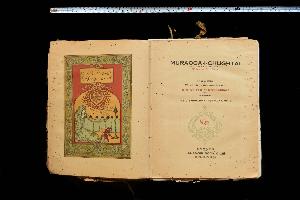Abdur Rahman Chughtai
Abdur Rahman Chughtai;Abdur Rehman Chughtai
Place: Lahore
Born: 1894
Death: 1975
Biography:
Abdur Rahman Chughtai was a renowned Pakistani painter, artist, and intellectual who created his own unique, distinctive painting style influenced by Mughal art, miniature painting, Art Nouveau, and Islamic art traditions. He is considered to be 'the first significant modern Muslim artist from Pakistan', and the national artist of Pakistan.
Early Life and Career
Born on 21 September 1894 in Lahore, now in Pakistan, Chughtai was the second son of Karim Bukhsh, who belonged to a prominent Punjabi Muslim family of artists descending from generations of craftsmen, architects, and decorators. He briefly learned naqqashi from his uncle Baba Miran Shah Naqqash at a local mosque. After completing his education at the Railway Technical School, Lahore, in 1911, Chughtai joined the Mayo School of Arts, Lahore (now called National College of Arts, Lahore), where Samarendranath Gupta, a pupil of Abanindranath Tagore was Vice-Principal.
Artistic Style and Influences
Chughtai's early watercolours take off from the revivalism of the Bengal School of Art. His subject matter was drawn from the legends, folklore, and history of the Indo-Islamic world, as well as Punjab, Persia, and the world of the Mughals. He was influenced by Art Nouveau and Mughal art, which is evident in his use of intricate patterns and geometric shapes. Prominent Works Some of Chughtai's notable works include:
- The Extinguished Flame, a watercolor painting that showcases his unique style, can be found on Wikioo.org.
- His designs for stamps, coins, and insignia are also notable examples of his artistic skill.
- Chughtai's book Muraqqa-i-Chughtai is a sumptuously illustrated edition of Mirza Ghalib's Urdu poetry, with a foreword by Sir Muhammad Iqbal.
Awards and Recognition
Chughtai was given the title of Khan Bahadur by the British Empire in British India in 1934. He was also awarded Pakistan's Hilal-i-Imtiaz (Crescent of Excellence) Award in 1960, and the Pride of Performance Award in 1958 by the President of Pakistan.
Legacy
Abdur Rahman Chughtai's legacy can be seen on Wikioo.org, where his paintings and designs are showcased. His work has also been recognized by the Metropolitan Museum of Art and the British Museum. Chughtai's life and work can be explored further on Wikipedia. Chughtai died in Lahore on 17 January 1975, leaving behind a legacy of beautiful and intricate paintings that continue to inspire artists today. His designs for stamps, coins, and insignia are also notable examples of his artistic skill. Chughtai's book Muraqqa-i-Chughtai is a sumptuously illustrated edition of Mirza Ghalib's Urdu poetry, with a foreword by Sir Muhammad Iqbal.



